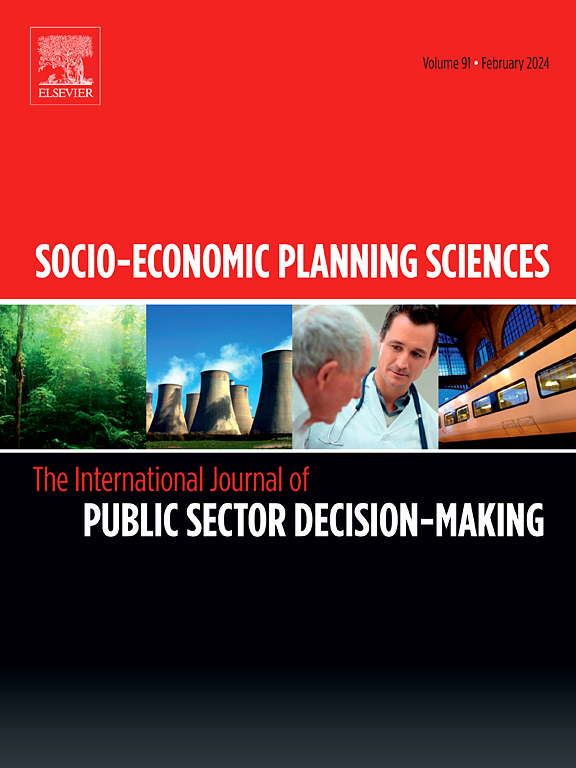Two stages method-based on Africa smart irrigation system assessment for willingness to pay: A case of Ghana Northern Region
IF 5.4
2区 经济学
Q1 ECONOMICS
引用次数: 0
Abstract
In northern Ghana, irregular rainfall poses a significant challenge for farmers. This research aims to investigate the readiness and ability of farmers in this area to invest in a smart irrigation system to tackle this problem and improve agricultural output. The research is motivated by the adverse effects of unpredictable rainfall patterns and droughts on agricultural yields in the area. To identify the key factors influencing farmers’ willingness to pay (WTP) and their maximum WTP for the smart irrigation system, the study utilizes the contingent valuation method (CVM). An integrated Bonferroni mean (BM), best-worst method (BWM) and technique for order preference by similarity to the ideal solution (TOPSIS) have been developed to evaluate these factors and rank the smart irrigation system options. A two-stage approach was proposed to account for the interrelationships among the WTP factors by integrating the Bonferroni mean (BM). Primary data was collected through a thorough survey involving 375 respondents from 125 households and 5 agricultural experts. The findings reveal that the maximum WTP for the smart irrigation system in Zabzugu District was GHS 628. Among the key factors of WTP, income level is the most significant factor and market condition is the least important factor. The effectiveness of the proposed method is demonstrated by ranking various smart irrigation system options. Weathermatic smartline was identified as the preferred choice and Galcon smart irrigation controllers as the least option. This study contributes to Ghana’s existing irrigation system literature and provides valuable insights for policymakers concerning sustainable agriculture.
基于两阶段法的非洲智能灌溉系统支付意愿评估:以加纳北部地区为例
在加纳北部,不规律的降雨给农民带来了巨大的挑战。本研究旨在调查该地区农民投资智能灌溉系统以解决这一问题并提高农业产量的意愿和能力。这项研究的动机是不可预测的降雨模式和干旱对该地区农业产量的不利影响。为了确定影响农民对智能灌溉系统的支付意愿(WTP)和最大WTP的关键因素,本研究采用条件估值法(CVM)。开发了综合邦费罗尼平均值(BM)、最佳-最差法(BWM)和通过与理想溶液相似度排序偏好技术(TOPSIS)来评估这些因素并对智能灌溉系统选项进行排序。通过积分Bonferroni均值(BM),提出了一种两阶段的方法来解释WTP因子之间的相互关系。主要数据是通过对125户家庭的375名回答者和5名农业专家的全面调查收集的。结果表明,沙布祖古区智能灌溉系统的最大WTP为GHS 628。其中,收入水平影响最大,市场条件影响最小。通过对各种智能灌溉系统方案进行排序,证明了所提出方法的有效性。Weathermatic智能生产线被认为是首选,而Galcon智能灌溉控制器被认为是最差的选择。本研究为加纳现有的灌溉系统文献做出了贡献,并为政策制定者提供了有关可持续农业的宝贵见解。
本文章由计算机程序翻译,如有差异,请以英文原文为准。
求助全文
约1分钟内获得全文
求助全文
来源期刊

Socio-economic Planning Sciences
OPERATIONS RESEARCH & MANAGEMENT SCIENCE-
CiteScore
9.40
自引率
13.10%
发文量
294
审稿时长
58 days
期刊介绍:
Studies directed toward the more effective utilization of existing resources, e.g. mathematical programming models of health care delivery systems with relevance to more effective program design; systems analysis of fire outbreaks and its relevance to the location of fire stations; statistical analysis of the efficiency of a developing country economy or industry.
Studies relating to the interaction of various segments of society and technology, e.g. the effects of government health policies on the utilization and design of hospital facilities; the relationship between housing density and the demands on public transportation or other service facilities: patterns and implications of urban development and air or water pollution.
Studies devoted to the anticipations of and response to future needs for social, health and other human services, e.g. the relationship between industrial growth and the development of educational resources in affected areas; investigation of future demands for material and child health resources in a developing country; design of effective recycling in an urban setting.
 求助内容:
求助内容: 应助结果提醒方式:
应助结果提醒方式:


